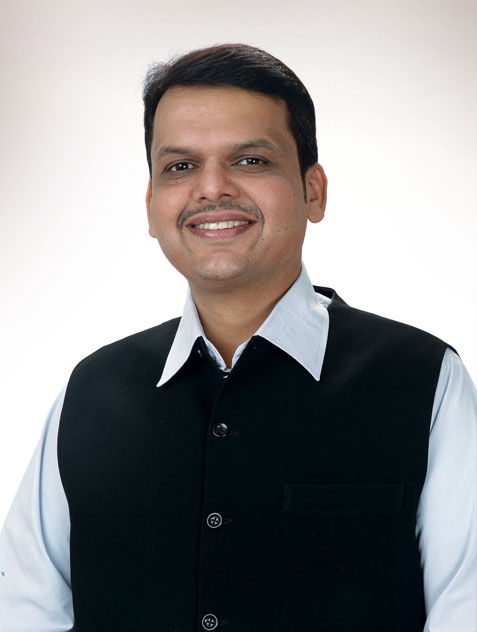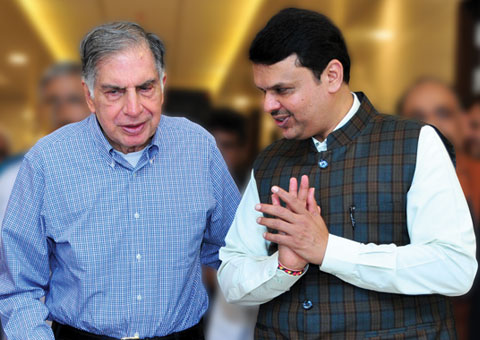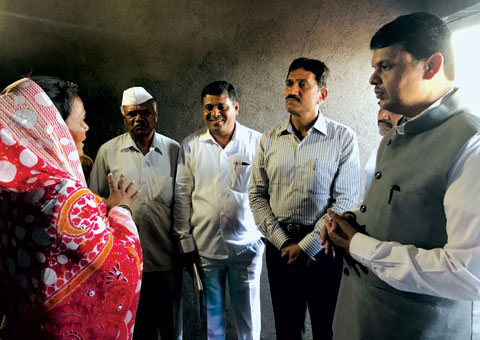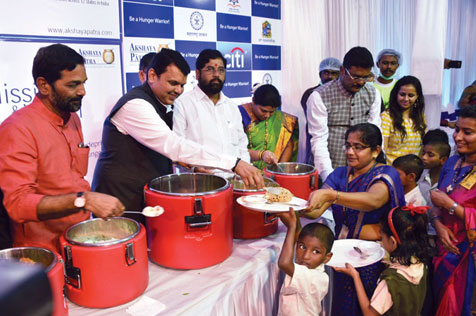‘The Trusts are the perfect partners for social transformation’
The Tata Trusts have deep-rooted links with Maharashtra. This is the state where the organisation is based and, more importantly, Maharashtra is the setting for some of the Trusts’ most impactful and ambitious initiatives in social development.
In this exclusive interview with Christabelle Noronha, Chief Minister Devendra Fadnavis shares his views on, and his vision for, the partnership between the Maharashtra government and the Tata Trusts in implementing social uplift projects across the spectrum, from nutrition and data governance to education, health and more. Excerpts from the interview:
You have risen through the ranks to the highest office in the state. What was your motivation to get into politics?
My father, Gangadharrao Fadnavis, has been my personal idol. He taught me the art of building and maintaining ‘good relations’. Though my inspiration and my values come from the RSS, my political affiliation was nurtured by my father. Besides him, my political idol has been Atal Bihari Vajpayee, our former prime minister. He gave you the feeling that he wouldn’t ever do anything that was wrong.

What is your view on the changing political landscape in the country, particularly in Maharashtra?
The union government under the strong leadership of Prime Minister Narendra Modi has achieved milestones of growth and progress. Despite the global economic slowdown, India has shown great stability and it has become the fastest-growing major economy in the world. Prime Minister Modi has made every effort to focus on the development of Maharashtra. The state has not just got support from him, but has also been a platform to launch and celebrate his initiatives. My government believes in inclusive growth, where discrimination has absolutely no place. Our policies have ensured a greater participation of people, with the single purpose of reaching the benefits of every project to last-mile users.
What was your earliest association with the Tata group?
Growing up in Nagpur, my earliest memory of the Tata group is of their textile mills in the city. The Empress Mills of Tata Textiles brought jobs and development to Nagpur and, over the years, I witnessed the group’s significant contribution to the region’s economic growth.
On a personal note, I remember accompanying my father, who was a cancer patient, for his treatment at the Tata Memorial Hospital in Mumbai. That was my first exposure to how the Tatas worked in setting up institutions for India and how dedicated they are to the community.
I remember accompanying my father, who was a cancer patient, for his treatment at the Tata Memorial Hospital in Mumbai. That was my first exposure to how the Tatas worked in setting up institutions for India.”
It was a matter of pride for me that Mr Ratan Tata was present when we inaugurated the National Cancer Institute in Nagpur last year. Doctors who trained at the Tata Memorial are working with the Institute to provide world-class treatment to cancer patients from the region.
The collaboration between the Maharashtra government and the Tata Trusts has reached new levels since you became the state’s chief minister. How has this enhanced engagement come about?
It is the coming together of like-minded people with a common objective, the prime one being to bring about positive change for the people of Maharashtra. After I assumed office, I was keen to engage with partners working in the philanthropy space. My philosophy is that increased people power leads to incremental and sustainable development. And there is no better partner than the Trusts to promote philanthropic work in the state and be a catalyst for change.
Mr Tata brings immense passion to the responsibility. His vision lies in building partnerships with governments and in making a success out of them. Mr Tata’s understanding of the dual challenge of quality and scale, and his willingness to take unconventional challenges and test approaches have contributed enormously to our shared vision to come together to solve several key challenges in the state.
We both believe that the true challenge is not just about solving a pressing problem, but also about empowering the person whose problem has been solved to deal with it in the future. That’s the litmus test for a sustainable solution.

The multifaceted development programmes being implemented in Maharashtra are a striking example of how public-private partnerships can bring about sustainable social change. What was the philosophy behind the government’s strong push for this?
Albert Einstein once said that problems cannot be solved at the same level of awareness as that at which they are created. People are at the core of problems, and people are at the core of solutions. It has to be more than PPP [public-private partnerships]; it has to be PPPP, the fourth ‘P’ being people. They are the most important stakeholders in any initiative and we, as partners, have values that align well to ensure their sustained empowerment. The idea is to identify the problem and develop a ‘pro-people’ solution with the appropriate tools and technologies, and with imaginative thinking.
This 4Ps model leads to 4Fs: funds, functions, functionaries and facts (or knowledge). These get decentralised in the partnership, enabling true democracy to exist and flourish. Examples of this approach and their successful deployment are the urban primary healthcare programme in Nagpur; the Jalyukt Shivar initiatives in Amravati, Akola and Yavatmal; women’s empowerment projects such as ‘internet saathi’ to bridge the digital divide; and the Muktipath project in Gadchiroli.
Maharashtra and the Trusts have collaborated to good effect in providing meals to children. What, from the government perspective, have been the key takeaways from this success?
Our partnership with the Trusts to operate the Annapurna centralised kitchens at Palghar has been hugely successful. A key learning for us is that the kitchens can be run in partnerships, with techno-managerial and human resources support coming from the partner. These kitchens are managed efficiently, they prepare high-quality, nutritious meals, and they yield significant savings as well. For instance, we have saved ![]() 30 billion in the 10-month period we have been running the kitchen in Palghar.
30 billion in the 10-month period we have been running the kitchen in Palghar.
The involvement of the partner, from drafting of policies and training to implementing programmes and building capacities, is showing great results. In Palghar, we have successfully integrated the centralised kitchen with the triple-A platform of anganwadis [mother and child-care centres], Asha centres and the Annapurna scheme to create a robust infrastructure with strong systems.
Streamlining supply-side issues by upgrading infrastructure, as we did with the centralised kitchens and ‘integrated child development services’ has enhanced our understanding of how to collaborate with an expert and resourceful partner like the Tata Trusts.
People are at the core of problems, and people are at the core of solutions. It has to be more than PPP [public-private partnerships]; it has to be PPPP, the fourth ‘P’ being people.”

Cancer care is another area where the Trusts have partnered the Maharashtra government. What is the way forward here?
I am extremely satisfied with the work we have done in cancer research and treatment. The sheer diversity of engaging all medical colleges in the National Cancer Grid, the launch of the ‘virtual tumour board’, and establishing centres of excellence along the lines of the National Cancer Institute in Nagpur have enabled us to provide affordable and accessible care to patients across the state.”
Your government and the Trusts have also come together to reform the criminal and juvenile justice system. What’s your view on this programme?
The collaboration with the District Legal Service Authority on the legal aid programme has institutionalised access to legal aid and improved legal representation for prisoners. Meanwhile, networking with NGOs on health has meant regular and focused medical camps for various ailments and the timely delivery of treatment to prisoners. These and other progressive projects can be replicated by other states of India.
From your experience, what is the best way forward in creating an environment in which governments, philanthropic organisations, NGOs and civil society can join hands for the common good of society?
I believe that a social organisation has five key purposes. First, to be a moral torchlight for society and set higher values; second, to serve the underserved; third, to create knowledge and provide creative solutions; fourth, to be a channel for others to express their desire to contribute; and fifth, to play the role of whistleblower. The synergy of these five leads to a changed individual and, down the road, a transformed society. The state should respect this and strive to create a conducive atmosphere for the fulfilment of these purposes.
My understanding is that, first and foremost, the thematic and geographic priorities of the partners should be respected to the utmost while establishing long-term partnerships. This can ensure true and sustained commitment. The government should, on its part, alter its mental framework to allow for out-of-the box thinking to be implemented and developed.
Our partnership with the Trusts to operate the Annapurna centralised kitchens has been hugely successful. A key learning for us is that the kitchens can be run in partnerships...”
If you had to pick three areas in the social development space where you think the Tata Trusts have had a significant impact, what would these be and why?
Health, village development and institution building — these are three areas where the Trusts have pursued a unique synergy of micro- and macro-level work, individual service and system strengthening. The Trusts are the perfect partners for social transformation.
How do you see the partnership between the Trusts and the Maharashtra government evolving in the coming years?
One immediate opportunity is to scale up partnerships in the areas of water conservation, health, skills development, digital literacy and women’s empowerment. Additionally, we need to create innovative solutions for financial inclusion, focus on key geographies for long-term and multi-thematic work, and develop techno-managerial support to implement programmes. Another space that remains to be explored effectively is developing health models for tribal people as well as those living in urban slums.
Finally, what critical challenges do you face in your role as chief minister and what keeps you motivated?
The first big challenge was to tackle the worst ever agrarian crisis in the state. I can say with a sense of satisfaction that we could offer some drastic reforms to the agriculture sector, with a historic loan waiver which has benefited the most needy farmers.

However, I feel a lot many things are needed to be done. Investment as well as infrastructure were the neglected sectors so far and I’m happy to share with you that industry houses from India as well as abroad have exuded confidence in our government by announcing new projects. Providing job opportunities too has been a critical issue and we are dealing with it through skills training, encouraging startups, and filling up the vacancies that exist in the state government.
What keeps me working is my commitment to the people of the state. I believe in hard work and results. I have planned a lot many things and I’m executing most of them.